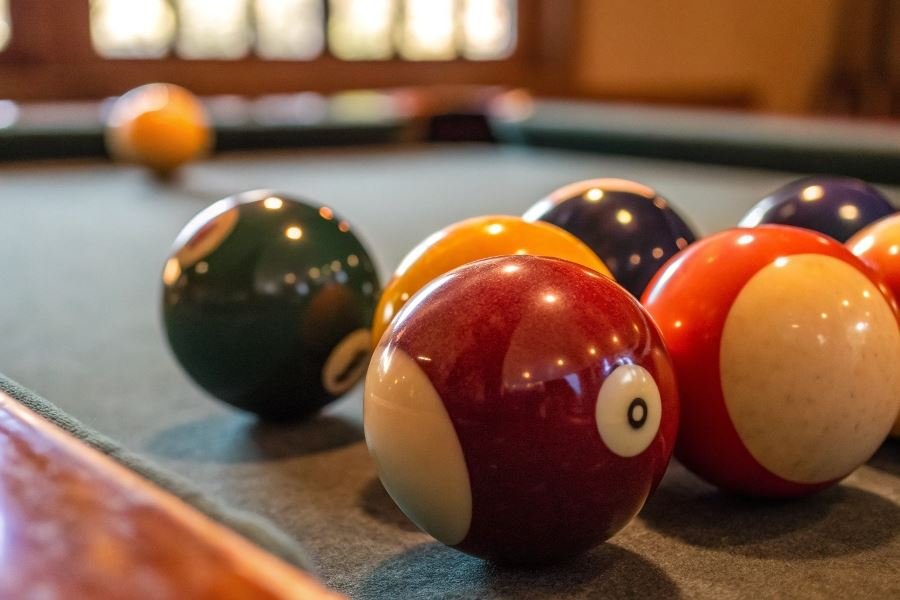
Ever watched a pro player execute a flawless bank shot and wondered why your attempts don’t quite measure up? Here’s a game-changing revelation: it might not be your technique—it could be your billiard balls.
The difference between amateur play and professional-level performance often comes down to equipment quality. Selecting the right billiard balls isn’t just about aesthetics; it’s about precision engineering that affects every aspect of your game. From the satisfying crack of a solid break to the predictable roll patterns that let you plan three shots ahead, quality balls transform your billiards experience.
The physics behind the perfect roll
Quality billiard balls are manufactured with incredible precision—often within tolerances of 0.001 inches in diameter and just 0.5 grams in weight difference between balls. This consistency ensures predictable behavior on the table, allowing you to develop muscle memory and strategic play that actually works.
“The ball is the only piece of equipment that touches everything else in the game—the cue, the cloth, other balls, and the rails. Its quality affects every single interaction on the table.” — Nick Varner, 6-time World Pool Champion
Different games, different demands
Your ball selection should align with your preferred game:
- Pool (8-ball, 9-ball): Requires phenolic resin balls with precise weight distribution
- Snooker: Demands smaller balls with exceptional rebound consistency
- Carom: Benefits from slightly larger, perfectly balanced balls for predictable cushion response
The right set doesn’t just improve performance—it protects your investment in tables and cues while providing the authentic playing experience that makes billiards one of the most enduring precision sports in history.
Essential Factors for Choosing Billiard Balls That Matter
When you step up to a billiard table, the quality of your game depends significantly on the equipment you’re using. The balls themselves are perhaps the most crucial component that can make or break your playing experience. Selecting the right set requires understanding several key factors that professionals consider essential.
For beginners looking to elevate their game, knowing how to choose billiard balls that match your playing style and preferred game type is fundamental knowledge. The difference between an average set and a premium one isn’t just about aesthetics—it’s about performance, durability, and consistency that can dramatically impact your development as a player.
Material Matters: Phenolic Resin vs. Polyester
The material composition of billiard balls represents the single most important factor in their performance and longevity:
Phenolic resin balls reign supreme in professional settings. These high-density balls offer exceptional:
- Resistance to impact damage
- Minimal wear over time
- Superior roll consistency
- Excellent rebound characteristics
Polyester balls occupy the budget-friendly segment but come with tradeoffs:
- Less durability (prone to chipping)
- Lower density affecting momentum transfer
- Less consistent rebound angles
- Faster wear patterns on the surface
The difference becomes apparent after just a few months of regular play. While polyester sets might save you $100-150 upfront, serious players inevitably upgrade to phenolic resin balls like those from Aramith for their unmatched performance characteristics.
Size and Weight Standards by Game Type
Different billiard games demand specific ball specifications:
| Game Type | Standard Ball Size | Weight Range | Notes |
|---|---|---|---|
| American Pool | 2¼ inches (57.15mm) | 5½-6 oz | Numbered 1-15 plus cue ball |
| Snooker | 2⅙ inches (52.5mm) | 4½-4¾ oz | 15 reds, 6 colors, 1 cue ball |
| Carom | 2⅜ inches (61.5mm) | 7-7½ oz | 3 balls (white, yellow, red) |
| English Pool | 2 inches (50.8mm) | 4-4¼ oz | Reds/yellows or spots/stripes |
Using incorrectly sized balls can damage your table cloth and cushions while fundamentally altering the physics of the game.
Balance, Roundness and Surface Finish
Premium billiard balls distinguish themselves through three critical quality factors:
Balance – High-quality sets maintain a consistent center of gravity across all balls, ensuring predictable roll patterns. Even slight imbalances of 0.5% can cause noticeable deviation over distance.
Roundness – Professional-grade balls maintain roundness tolerances within 0.001 inches. This precision ensures that contact points between balls create consistent energy transfer and predictable angles.
Surface finish – The microscopic texture of the ball surface affects:
- Friction against the cloth
- Spin retention
- Cleanliness (how easily chalk marks and oils are removed)
- Visual clarity of markings
Top Manufacturers and Their Standout Products
The billiard ball market features several distinguished manufacturers:
- Aramith – The gold standard in the industry
- Tournament Pro Set: Used in most professional tournaments
- Premium Set: Excellent balance of quality and value
- Super Pro Cup Set: Features enhanced visibility markings
- Brunswick – America’s heritage brand
- Centennial Set: Premium phenolic construction
- Gold Crown Set: Tournament-grade performance
- Predator – Innovation-focused manufacturer
- Arcos II Set: Precision-engineered for competitive play
- Poison VX Sets: Features vibrant, high-contrast colors
When investing in billiard balls, remember that a quality set from these manufacturers will outlast several cheaper alternatives while providing consistent performance that helps develop your skills properly from the beginning.
Making Your Final Decision: The Ultimate Billiard Ball Buying Guide
When you’re standing at the crossroads of billiard ball options, making that final decision can feel like lining up the perfect break shot. Let’s cut through the confusion and help you rack up the perfect set for your needs, skill level, and budget.
Smart spending for lasting performance
The price range for billiard balls is remarkably wide—from $30 budget sets to professional-grade options exceeding $300. But here’s the insider truth: value doesn’t always correlate directly with price.
Mid-range phenolic resin balls (around $80-150) often represent the sweet spot for serious beginners. They deliver professional-level consistency without the premium price tag of tournament-grade sets. Consider this investment math:
| Ball Type | Initial Cost | Lifespan | Cost Per Year |
|---|---|---|---|
| Economy Polyester | $30-60 | 1-2 years | $30 |
| Mid-range Phenolic | $80-150 | 5-8 years | $19 |
| Premium Aramith | $200-300 | 8-15+ years | $20 |
As you can see, spending more upfront often translates to better long-term value. A quality set from Aramith might cost three times more than budget options but can last five times longer with proper care.
Keeping your investment rolling
Different ball materials demand different maintenance approaches, and this maintenance factor should weigh heavily in your decision.
Polyester balls require gentle cleaning with mild soap and water, avoiding alcohol-based cleaners that can damage their surface. Their porous nature means they’ll need replacement sooner as they absorb oils and dirt.
Phenolic resin balls strike a balance—they need regular cleaning with specialized billiard ball cleaner, but resist staining and maintain their polish longer than polyester alternatives.
Premium phenolic balls are maintenance champions. Their dense composition resists dirt penetration, and they maintain their luster even with minimal care. A quick wipe with Aramith Ball Cleaner after play sessions keeps them in tournament condition.
Pro tip: No matter which balls you choose, never use household cleaners containing abrasives or harsh chemicals. They’ll strip the polish faster than a miscued jump shot.
Matching balls to your billiards journey
Your playing frequency and skill aspirations should guide your final decision:
Occasional players (monthly games) can start with quality polyester balls ($40-70 range). They’ll provide adequate performance for casual play without significant investment.
Regular enthusiasts (weekly games) benefit most from mid-range phenolic resin balls. The Brunswick Centennial set offers exceptional value, delivering consistent roll and impact resistance that will support your developing skills.
Dedicated players (multiple weekly sessions) should consider premium options like the Aramith Premium or Super Aramith Pro sets. Their precision manufacturing ensures perfect balance and consistent density—qualities that become increasingly important as your skills advance.
Remember that ball quality affects more than just durability—it influences how consistently you can execute shots. As your skills improve, you’ll appreciate the predictable performance of higher-quality balls, making them a worthwhile investment for anyone serious about improving their game.
